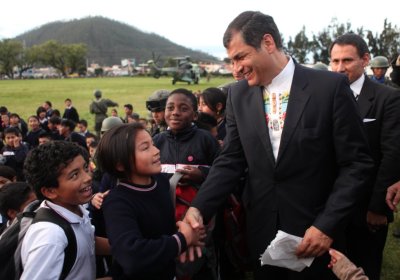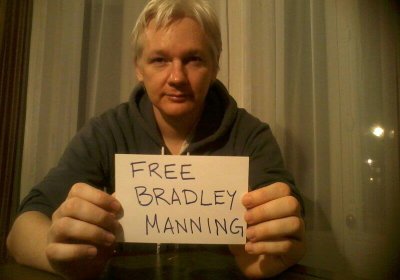Cables from the first term of Ecuadorian President Rafael Correa show how the US sought to defend the interests of US companies in Ecuador, and protect the position of foreign investors in general. Moves against the power of transnational corporations by Correa's government, first elected in 2006, were seen as attempts to increase control over the economy, which the US government views as the domain of private interests. The US Embassy in Quito therefore tried to influence Ecuadorian economic policy in conjunction with allies from other embassies and from within the private sector.
Linda Pearson
Cables sent from the US Embassy in Quito during Rafael Correa’s first three years as president document rising tensions between Ecuador and the US.
Correa’s government, first elected in 2006, increasingly rejected US hegemony and asserted control over Ecuador’s economic and political development.
The cables highlight the embassy’s preoccupation with Ecuador’s “difficult investment climate”, with many reports attempting to assess and predict Correa’s economic policies.
In November 2006, leftist candidate Rafael Correa won the second round of the Ecuadorian presidential election with 57% of the vote, compare with his conservative opponent, Alvaro Noboa, who won 43%.
Despite the US’s failure to undermine Correa’s candidacy, as shown by diplomatic cables published by WIkiLeaks, further US cables suggest the US Embassy in Quito believed it could hold sway over the new government.
In the months leading up to Ecuador’s October 2006 presidential election, the US Embassy in Quito claimed to be impartial.
Rather than supporting one particular candidate, then-US ambassador Linda Jewell said the embassy only wanted to help facilitate “a fair and transparent electoral process”.
Ecuador's pro-US neoliberal president Lucio Gutierrez was ousted in 2005. Since then, relations between Ecuador and the United States have deteriorated, with the Andean nation’s increasing rejection of US hegemony.
The government of Rafael Correa, first elected in 2006, has broken from the neoliberal doctrines Washington has imposed on Latin America. It has embraced regional integration, moving closer to its neighbours and further away from the US.
Diplomatic cables published by WikiLeaks show how hard the US fought to control Ecuador's future post-Gutierrez.
Since Ecuador's president Lucio Gutierrez was ousted from power in 2005, relations between Ecuador and the United States have deteriorated with the Andean nation’s increasing rejection of US hegemony.
The government of Rafael Correa, first elected president in 2006, has embraced regional integration, moving closer to its neighbours ― in particular Venezuela and Bolivia ― and further away from the US.
Economically, the Correa administration has pursued policies that break with the neoliberal doctrines Washington had imposed on Latin America.
The International Criminal Court (ICC) was established at The Hague in 2002 to investigate and prosecute individuals alleged to have committed war crimes, crimes against humanity and the crime of genocide.
Between 2002 and 2009, the Bush administration implemented sanctions on military aid and Economic Support Funds (ESF) assistance against states which refused to sign “Article 98” agreements with the US. Under such agreements, states agreed not to transfer US nationals to the ICC without the consent of the US government.
The International Criminal Court (ICC) was established in 2002 at The Hague in the Netherlands to prosecute individuals alleged to have committed war crimes, crimes against humanity and the crime of genocide.
From the ICC’s inception, the US objected to the possibility that its nationals could be subject to the court’s jurisdiction.
The International Criminal Court (ICC) was established to prosecute individuals alleged to have committed war crimes, crimes against humanity and genocide.
From the ICC’s inception, the US objected to the possibility that US nationals could be subject to its jurisdiction.
The administration of former US president George W Bush waged an aggressive campaign to persuade states to sign “Article 98”, or bilateral immunity agreements. Those that signed agreed not to transfer US nationals to the ICC.
Between 2002 and 2009, sanctions were implemented on states that refused to sign.
Chelsea (formerly Bradley) Manning was sentenced to 35 years in prison on August 7 for leaking classified US government documents to WikiLeaks.
These documents revealed evidence of war crimes and human rights abuses carried out at the behest of the US government. Diplomatic cables leaked by Manning also show the lengths to which the Bush administration was prepared to go to ensure that those responsible for such crimes would remain unreachable under international law.
Immunity
Australian foreign Minister Bob Carr finally acknowledged the US grand jury investigation into WikiLeaks and its founder Julian Assange on June 5.
This investigation will decide whether Assange should be prosecuted for his role in releasing confidential documents through WikiLeaks.
Despite the risk to Assange, Carr told a Senate budget estimates committee that the Australian government will not be seeking information from the US government about the grand jury, because “it doesn’t affect Australian interests”.
WikiLeaks released an enormous treasure-trove of classified US government documents in 2010. It included US military logs from the wars in Iraq and Afghanistan, over 250,000 diplomatic cables, and Collateral Murder, a video depicting the killing of 12 civilians by a US helicopter gunship in Iraq.
The source of the leaks, US Private Bradley Manning, acted on his conscience. He believed that people have a right to see the information he had been privy to as an army intelligence analyst. He was prepared to risk his life and liberty to reveal that information.
- Previous page
- Page 2
- Next page











